Empowering Women in the Field: Binda’s Story
by Jacob Brescia-Weiler
Binda Ayu is a tomato farmer in the Sindhuli district of Nepal. As a member of the Creative Women’s Group, the first savings and credit cooperative of its kind in the area, she is supported by Groundswell International and its local partner organization, Sindhuli Integrated Development Services (SIDS/Nepal).
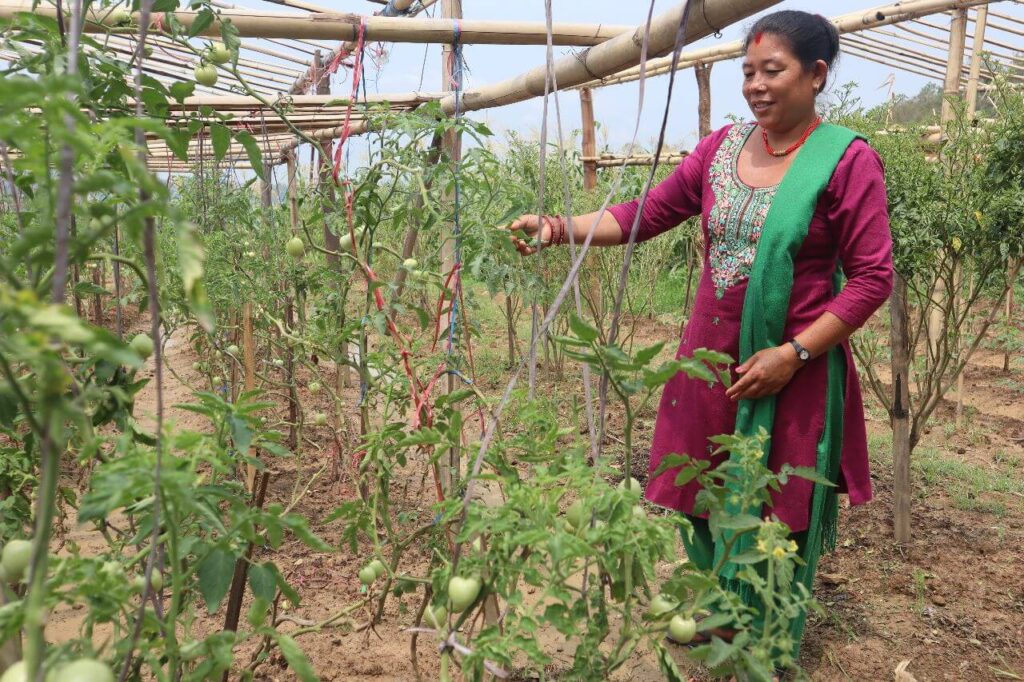
Groundswell Programs Empower Women
Binda joined the savings and credit group 18 months ago, motivated to access high-yielding variety seeds and support with raising livestock. Given the quickly growing productivity of her farm since then, she is confident she made the right decision.
“I had heard by word of mouth that the group was doing very well,” Binda said during our recent visit to her farm, “I now realize this is absolutely true.”
Binda primarily grows tomatoes because they are more profitable and produce for a longer period than other crops. She also cultivates a variety of other vegetables, including cabbage, cauliflower, cucumber, cowpea, and bitter gourd, depending on what is in season. Binda uses plastic tunnels to farm tomatoes year-round, which protects them from extreme climatic conditions.
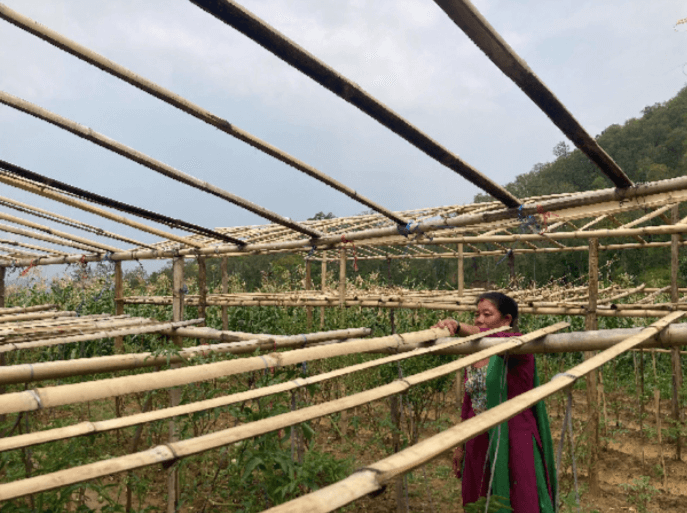
“Before joining the Creative Women’s Group,” she explained, “I had only one plastic tunnel constructed with bamboo from my land.”
Three months ago, Groundswell and SIDS/Nepal granted Binda an additional plastic tunnel for tomato farming. Since early 2022, she has also received support to access seeds (both tomato and fodder crops), and materials to facilitate vermicomposting and biofertilizer preparation, including cement and drums, as well as technical training.
While she has only recently adopted these farming strategies, they have already made a significant impact.
“Now that I have two plastic tunnels, I can grow a much higher volume of tomatoes,” Binda reported. “This means that my income has already started to increase considerably.”
In the three months since erecting the second plastic tunnel, Binda has sold approximately 35 kilograms (about 77 pounds) of tomatoes, after home consumption. Considering that tomato plants typically remain productive for at least 9-12 months, she expects her crop yield and profit to keep rising.
Binda’s husband shared another impressive figure. On the same plot of land where they have historically produced an average of 7,000 Nepali Rupees (NPR) worth of cereals (about US$53.30), they produced 50,000 NPR worth in 2022 (about US$380.85). In 2023, they are expecting 75,000 NPR worth of crop yield (about US$571.30) thanks largely to the new plastic tunnel.
This flourishing productivity has encouraged Binda to shift her focus from only subsistence-level farming to local commerce. Previously, she grew supplementary crops, such as cowpea and legumes, mainly to feed her family; in recent months, she has produced a surplus, selling 50 kilograms (about 110 pounds) of cowpeas at the local market. She plans to do the same with other vegetables. Now, her family and local consumers have greater access to healthy local food.
Binda’s budding success has also brought newfound financial independence.
“I used to depend mostly on my husband for money,” she said. “But now I have funds of my own to contribute. I can finally provide for my children and pay for basic family needs.” Binda’s youngest daughter, Sinda, a 14-year-old who spoke with us during a break from school, offered her own perspective on shifting family dynamics: “We don’t need to buy vegetables from the market nearly as much anymore; now we have a lot of extra support that was not available before.”
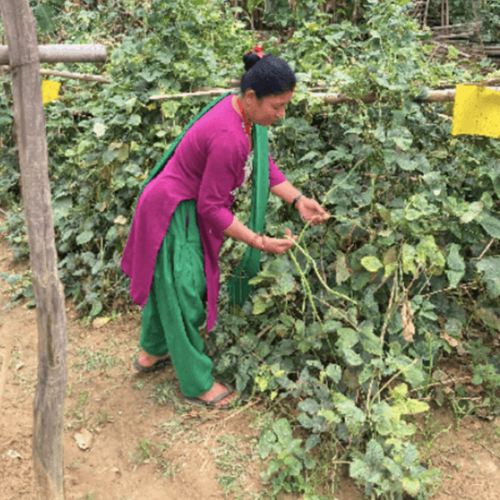
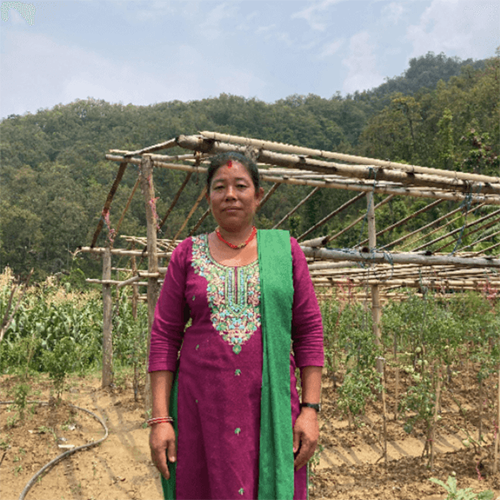
Beyond money, Binda has a strengthened sense of self-confidence. “I feel much more comfortable talking to new people now; I can introduce myself and speak openly.” Binda is particularly eager to share advice about tomato farming and teach other local farmers. “I tell them to start with a small area of land, and expand later on once they’ve seen initial success.”
Groundswell and SIDS/Nepal have also supported Binda in going on an exposure visit to a nearby agricultural learning center to learn from the experience of other women farmers. She was impressed by the drip-irrigation technology she observed there and hopes to implement the same practice on her farm.
Resilience Through Obstacles
While Binda was previously illiterate, she has also started learning to read and write, already making fast progress.
“One major challenge is water scarcity during the winter season,” Binda said. “Drip-irrigation makes water use more efficient because water droplets go directly to the root system.”
Another obstacle Binda faces is the high infestation of crop pests and insects in her fields. Groundswell and SIDS/Nepal have been supporting her with biofertilizer and biopesticide development, which has allowed her to stop spraying chemicals on her vegetables.
Looking Towards The Future
In the future, Binda also plans to receive assistance with livestock shed improvement. In addition to easing the collection of animal waste for biofertilizer, this will help keep her livestock healthy, which is vital given the lack of adequate veterinary care in the area.
In other neighboring farms, SIDS/Nepal has supported women’s groups with revolving funds for goats and buffaloes, allowing them to multiply the number of beneficiaries. Binda hopes to take advantage of this opportunity as well.
At the end of our visit, Binda sliced a large cucumber from her farm for us to taste. She flashed a satisfied smile as we enjoyed the crisp vegetable.
“I am very grateful for the opportunity to share my story,” she told us. “I feel energized and encouraged to keep expanding in the coming days.”
As she gave us a tour of her land, it was clear to see her pride in what she has achieved.
“Please come visit again,” she insisted before we left, “I will keep making my farm better and better.”
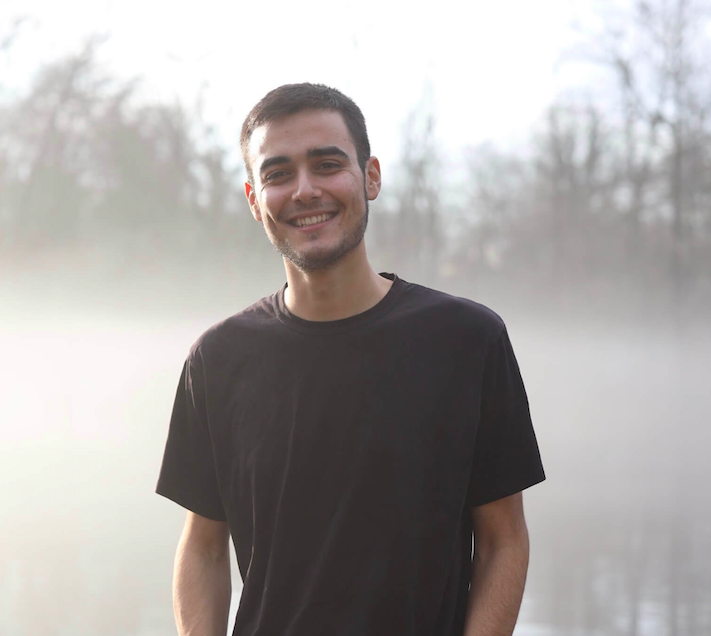
About the Author
Jacob Brescia-Weiler, son of Groundswell’s Executive Director and Co-Founder Steve Brescia, graduated from Tufts University in 2017 and has worked to provide legal and support services to immigrants in Guadalajara, Mexico, New York City, and the Washington, DC area. He will attend UC Davis Law School in August 2023. He spent the last year working and traveling in Vietnam. He is grateful for the opportunity to visit Groundswell’s Nepali partner, BBP Pariwar, and learn about the work of women’s self-help groups.
